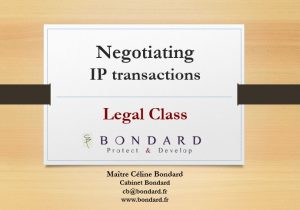

How to negotiate an intellectual property contract? How to register a trademark in France? This legal class has been given by Céline Bondard,esq., in AT Ecole Polytechnique in March 2017.
SUMMARY
I. Negotiating Intellectual Property Contracts
A.The different types of contracts
B.A few essential clauses
C.Creative Common Licences
II. Registering your trademark in France
A.The French IP Code
B.How to register your trademark in France
I. Negotiating Intellectual Property Contracts
A.The different types of contracts
TYPES OF CONTRACTS
- I want to buy or sell: products / services
- I want to develop: co-development, partnerships,…
- I want to have the authorizations to exploit: assignment of certain rights, licences, franchises, …
QUESTIONS TO ASK YOURSELF
- If I am selling or buying: who will own the IP rights? Which rights, for which use?
- If I am transferring or receiving know-how: who can communicate what? Who can use what?
- Anticipate for potential litigation between the parties, and with third parties: who guarantees what?
Example
You are buying a car or a computer. What are you buying?
- Just the machine, and sometimes technical assistance. But not the technology incorporated in the machine, which you do not have rights upon.o
- Similarly, the physical or electronical transfer of a good does not give you any intellectual property rights to that good.
- Even the source code of a computer program is not transferred when you purchase the right to use / exploit a computer program, if not clearly stated.
B.A few essential clauses
« Any global assignment of a future work is invalid » (Article 131-1 of the IP Code)
« The Contractor acknowledges that all intellectual property rights attached to the Work of Art belongs exclusively to the Company and shall not contest these rights »
«I assign all my intellectual property rights »
« Intellectual property rights will be shared in equal parts between the parties »
« The Company holds the original intellectual property rights pertaining to the Services (as well as any extensions and renewals of rights), known or unknown, whether the Services are created before or after this date, and the Contractor declares having assigned all his rights to the Company »
Example
« By the terms of this Contract, the Assignor assigns exclusively and definitely to the Assignee, as the Work of Art is being realized, the entirety of the author’s rights pertaining to the Work of Art.
The Assignor assigns in particular to the Assignee the rights to use, modify, reproduce, perform, release, display, create derivative work of the Work, commercialise, by any means possible, on any material support.
This assignment is effective for France and abroad, and for the duration of the intellectual property rights pertaining to the Work.
The Assignee shall, as he or she wishes, exploit the Work, as well as any derivative or adapted version thereof that he or she would realize, in particular by means of licensing, for his sole benefit and without owning any royalties to the Assignor. »
Question
The term forbidding the employee to « make a competing company benefit, in any manner, from the knowledge acquired during his employment contract » is :
- a NDA term; or,
- a non-competing term ?
Definition
The non-competing term can be defined as the clause from which an employee has committed to not compete with his employer or any third party.
The non-competing term is applicable during the course of the contractual relationship, and in most cases, also for a while after its termination .
LAWFULNESS OF NON-COMPETING TERM
Each non-competing term, which may be highly constraining and burdensome for its debtor, have to be unequivocally agreed by the latter.
In France, non-competing terms are by principle lawful (Soc, 6 décembre 1967, n° 66-40.456).
Nonetheless, in order to not restrain too much the constitutional principle of freedom of commerce and industry, their validity is subjected to the following conditions (4) :
The non-competing term must be bound to :
- The nature of the professional activity
- A time limitation
- A geographical limitation
- A reasonable interest for the employer to impose such non-competing term
C.Creative Commons Licences
TO BE PI OR NOT TO BE PI
Property is the result of one’s work
« Property is theft »
(Joseph Proudhon, journalist from the 19th century).
What do you think?
The Creative Commons movement: « Creative Commons is a non-profit organization that enables the sharing and use of creativity and knowledge through free legal tools » (http://creativecommons.org/about)
- « Want to let people share and use your photographs, but not allow companies to sell them?
- Looking for access to course materials from the world’s top universities?
- Want to encourage readers to re-publish your blog posts, as long as they give you credit?
- Looking for songs that you can use and remix, royalty-free? »
CREATIVE COMMONS
- BY : Exploitation + derivative work + commercial use;
- BY NC : Exploitation + derivative work BUT not commercial;
- BY ND : Exploitation + commercial BUT not derivative work;
- BY SA : Exploitation + derivative work + commercial use IF share alike;
- BY NC SA : Exploitation + derivative work IF share alike, BUT no commercial use;
- BY NC ND : Exploitation BUT no commercial use AND no derivative work.
All CC licenses are intended to work worldwide: they are drafted with a global network of affiliates and intended to be internationally valid.
CC offers a core suite of six international copyright licences that are drafted based largely on various international treaties governing copyright.
How can I apply a Creative Commons license to my material (offline): you choose your licence and then mark your work with a statement such as « This work is licensed under the Creative Commons (NAME OF LICENCE) Licence. »
Registering your trademark in France
A. The French IP Code
- L711-1 French IP Code : « A trademark is a sign that may be represented graphically and which serves to distinguish products or services of a physical or personal or moral entity »
- It needs to be registered before a Trademark Office to be protected
- It’s a perpetual right – renewable every 10 years
B. How to register your trademark in France ?
- The French IP Office is the Institut National de la Propriété Industrielle, commonly called the INPI.
- All processes are available online.
- It’s strongly advised to order a search trademark report to evaluate the risk of seeing your trademark opposed by a third party.
Refusal in case of likelihood of confusion
- Refusal of the registration of your trademark will occur in case of likelihood of confusion.
- For instance, the Paris Appellate Court decided that the famous French Cheese producer “The Laughing Cow” could lawfully be opposed to the registration of the trademark “The Serious Cow ”, under the ground of likelihood of confusion.
European Trademark
- You can register an European Trademark before the European Intellectual Property Office, the EUIPO.
- Your European Trademark will be protected in all the Members States.
- Third party opposition has to be introduced before the EUIPO.
Extending your trademark internationally
- Once your trademark is registered in France, or in the European Union, you will be able to extend its protection internationally before the World Intellectual Property Office, the WIPO.
- The extension is possible through the Madrid System, covering most foreign countries.
Thank you!
Maître Céline Bondard
Attorney at Law, New York and Paris’ bar
President and co-founder of French-American Bar Association France
www.bondard.fr
cb@bondard.fr

